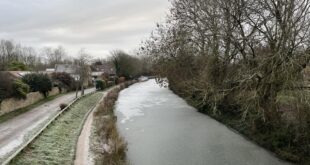LONDON — What does Pink Floyd’s David Gilmour have in common with the London-based environmental law charity ClientEarth?
Quite a lot, as it happens. Mr. Gilmour sold his guitar collection for $21.5 million at Christie’s New York in June — and donated every penny to ClientEarth to help it fight climate change.
For a nonprofit with rock-star benefactors, ClientEarth is fairly low key. It operates in the background, incrementally and strategically, much like the lawyer who set up its climate team four years ago, Gillian Lobo.
Ms. Lobo, a Briton of Indian descent who spent the first six years of her life in Tanzania and Kenya, started her legal career at a private practice in Croydon (outside London), then became an in-house lawyer for Royal Mail, the postal service.
From 2006 to 2015, she worked for the British government, mostly as a litigator in military cases. Starting in 2010, she was part of the team that defended the Ministry of Defense against negligence claims linked to the deaths of three British servicemen and the serious injuries of two others in “friendly fire” episodes in Iraq.
She joined ClientEarth in 2015 and has been busy taking the British government to court pretty much ever since.
While the bulk of her career has taken place in Britain, she also spent six months volunteering for the Presbyterian Church in Rwanda in 2002, eight years after the genocide. In the following conversation, which was edited and condensed, she began by recalling the experience.
What was Rwanda like?
It was a real eye-opener. I went out to all the projects — schools, medical institutions, places that trained people in agriculture. You could see how local people, given the knowledge and the ability, could actually do a lot for themselves, how effective projects could be.
I also saw how powerless people are treated. The authorities can abuse street children in any way, hit them, and no one can step in.
I saw a little boy being beaten in Kigali. We were trained to be careful not to enter into situations that we didn’t know the outcome of. You can go in and try and protect that child, and once you’re out of there, the police are going to take out any humiliation that you’ve heaped on them on that person. That was really important training.
It’s about being strategic. It’s pointless just tampering at the edges: You need to change important infrastructures.
Why did you choose climate as a field?
If you don’t get this sorted out, all of the development work that you ever wanted to do is never going to get off the ground. It’s all linked to droughts, water supply, how people work. The places that are being impacted are the ones that can least afford it: the droughts, the rains, the typhoons, the hurricanes, the increased heat that’s going to reduce the nutrient value of food growing in soil.
One could argue that what you do will produce benefits in the future, but won’t put bread on people’s table now.
We should be doing both. If you don’t get the fundamentals right, these problems are going to get worse and worse. If you build carefully and strategically, you can have an immediate impact.
You want to stop subsidies going to companies producing fossil fuels. You want subsidies going to renewables, or for it to be a level playing field — meaning no subsidies. Then renewables can increase, and immediately that money can go to something that’s going to protect the environment. It can also create jobs at a local level. People can be a bit more self-sufficient and have control of their lives.
What is the impact of climate change on women?
The impact is big, because the women most affected are generally poor women. They’re disproportionately impacted by extreme weather events and droughts. They’re usually the ones who have to go and collect water, and if there’s a drought, they have to go further. They’re the ones who collect wood, who feed the children. As the men go to the cities, they’re left on their own. And women, through wars and everything else, are more vulnerable — physically, sexually. It just makes everything a lot worse.
What is women’s role in fighting climate change?
Fundamental. They need to be part of the discussion, because they’re the ones on the ground. They’re seeing what’s happening. They can feed in far more valuable information about what’s happening to the land, what’s happening to the water, what improvements can be done, and how things are changing around them.
These women have cultural knowledge. They have practical, actual knowledge on the way to deal with climate change. That’s what you need.
What do you see as your own role in the world?
I can help develop the lawyers of the future, to work with these lawyers who are so bright but not necessarily experienced enough, and give them the tools and empower them.
To do what?
My aim is to make the world a fairer place. I believe in fairness, I believe in justice. I do recognize that the law is about tactics, strategies, doing the right thing at the right time. It can be seen as game playing. Don’t get me wrong, I quite enjoy it. But it’s not always about justice.
I believe in the rule of law and the need to maintain it. So much is being stripped from it across different states.
I also work on access to justice in the U.K. We’re trying to ensure that the cost for N.G.O.s and individuals bringing claims in order to protect the environment are kept as low as possible.
Where would you like to be in 10 or 20 years?
I’d like to have left a legacy where the law is safeguarded from fickle arbitrary executive decisions; where people can access and protect their environment, which is so important; and where we protect the world as much as we can from climate impacts.
Source link


